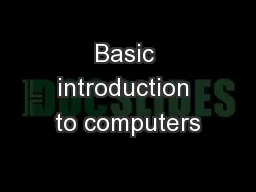PPT-Information in Computers
Author : myesha-ticknor | Published Date : 2016-10-15
Remember Computers Execute algorithms Need to be told what to do And to whom to do it Question How does the computer know what to act on Answer We tell it WHERE
Presentation Embed Code
Download Presentation
Download Presentation The PPT/PDF document "Information in Computers" is the property of its rightful owner. Permission is granted to download and print the materials on this website for personal, non-commercial use only, and to display it on your personal computer provided you do not modify the materials and that you retain all copyright notices contained in the materials. By downloading content from our website, you accept the terms of this agreement.
Information in Computers: Transcript
Download Rules Of Document
"Information in Computers"The content belongs to its owner. You may download and print it for personal use, without modification, and keep all copyright notices. By downloading, you agree to these terms.
Related Documents














